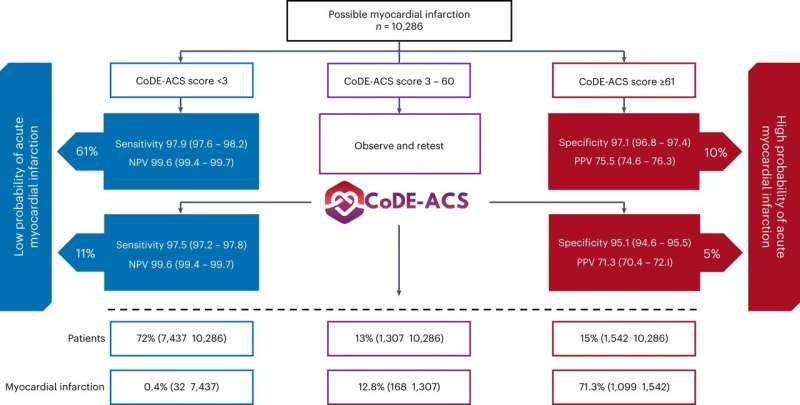This article has been reviewed according to Science X's editorial process and policies. Editors have highlighted the following attributes while ensuring the content's credibility:
fact-checked
peer-reviewed publication
proofread
Artificial intelligence could improve heart attack diagnosis to reduce pressure on emergency departments

An algorithm developed using artificial intelligence could soon be used by doctors to diagnose heart attacks with better speed and accuracy than ever before, according to new research from the University of Edinburgh published in Nature Medicine.
The effectiveness of the algorithm, named CoDE-ACS, was tested on 10,286 patients in six countries around the world. Researchers found that, compared to current testing methods, CoDE-ACS was able to rule out a heart attack in more than double the number of patients, with an accuracy of 99.6 percent.
This ability to rule out a heart attack faster than ever before could greatly reduce hospital admissions. Clinical trials are now underway in Scotland with support from the Wellcome Leap, to assess whether the tool can help doctors reduce pressure on our overcrowded Emergency Departments.
As well as quickly ruling out heart attacks in patients, CoDE-ACS could also help doctors to identify those whose abnormal troponin levels were due to a heart attack rather than another condition. The AI tool performed well regardless of age, sex, or pre-existing health conditions, showing its potential for reducing misdiagnosis and inequalities across the population.
CoDE-ACS has the potential to make emergency care more efficient and effective, by rapidly identifying patients that are safe to go home, and by highlighting to doctors all those that need to stay in hospital for further tests.
The current gold standard for diagnosing a heart attack is measuring levels of the protein troponin in the blood. But the same threshold is used for every patient. This means that factors like age, sex and other health problems which affect troponin levels are not considered, affecting how accurate heart attack diagnoses are.
This can lead to inequalities in diagnosis. For example, previous B d research has shown that women are 50 percent more likely to get a wrong initial diagnosis. People who are initially misdiagnosed have a 70 percent higher risk of dying after 30 days. The new algorithm is an opportunity to prevent this.
CoDE-ACS was developed using data from 10,038 patients in Scotland who had arrived at hospital with a suspected heart attack. It uses routinely collected patient information, such as age, sex, ECG findings and medical history, as well as troponin levels, to predict the probability that an individual has had a heart attack. The result is a probability score from 0 to 100 for each patient.
Professor Nicholas Mills, BHF Professor of Cardiology at the Centre for Cardiovascular Science, University of Edinburgh, who led the research, said, "For patients with acute chest pain due to a heart attack, early diagnosis and treatment saves lives. Unfortunately, many conditions cause these common symptoms, and the diagnosis is not always straight forward. Harnessing data and artificial intelligence to support clinical decisions has enormous potential to improve care for patients and efficiency in our busy Emergency Departments."
Professor Sir Nilesh Samani, Medical Director of the British Heart Foundation, said, "Chest pain is one of the most common reasons that people present to Emergency Departments. Every day, doctors around the world face the challenge of separating patients whose pain is due to a heart attack from those whose pain is due to something less serious."
"CoDE-ACS, developed using cutting edge data science and AI, has the potential to rule-in or rule-out a heart attack more accurately than current approaches. It could be transformational for Emergency Departments, shortening the time needed to make a diagnosis, and much better for patients."
More information: Nicholas Mills, Machine learning for diagnosis of myocardial infarction using cardiac troponin concentrations, Nature Medicine (2023). DOI: 10.1038/s41591-023-02325-4. www.nature.com/articles/s41591-023-02325-4


















